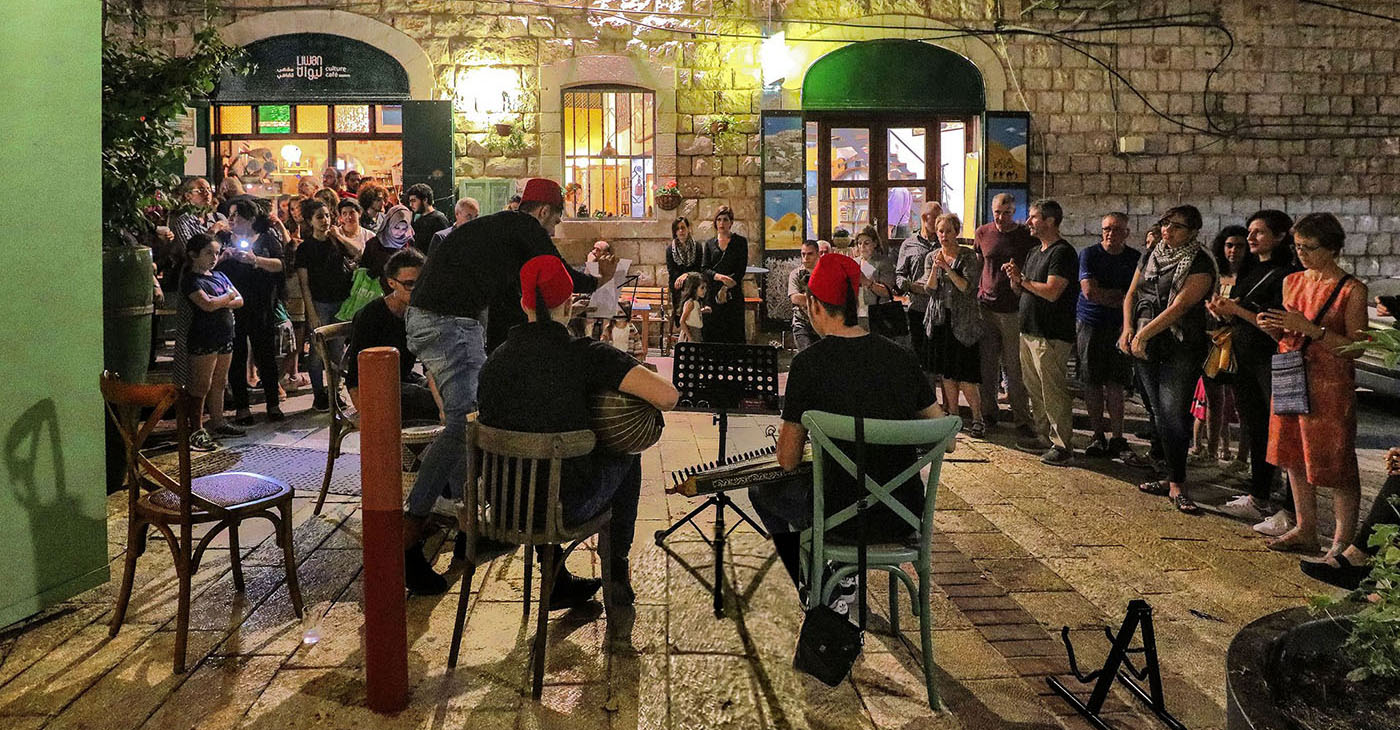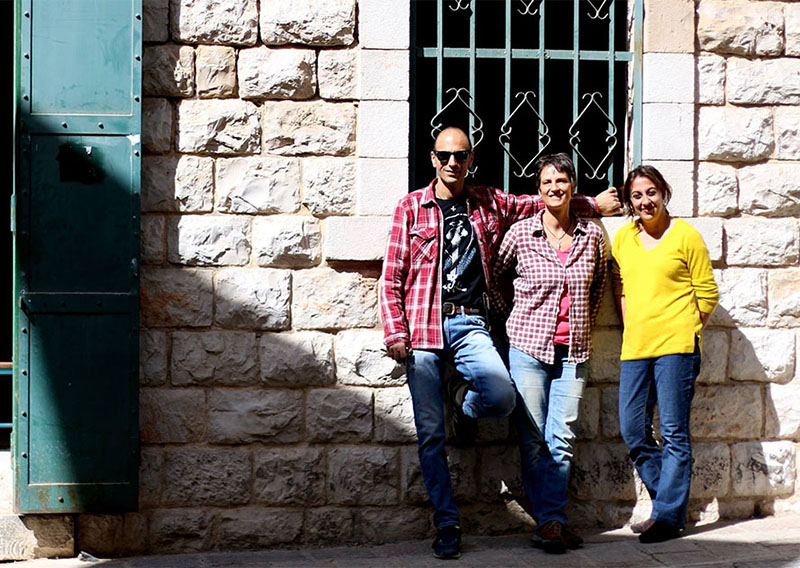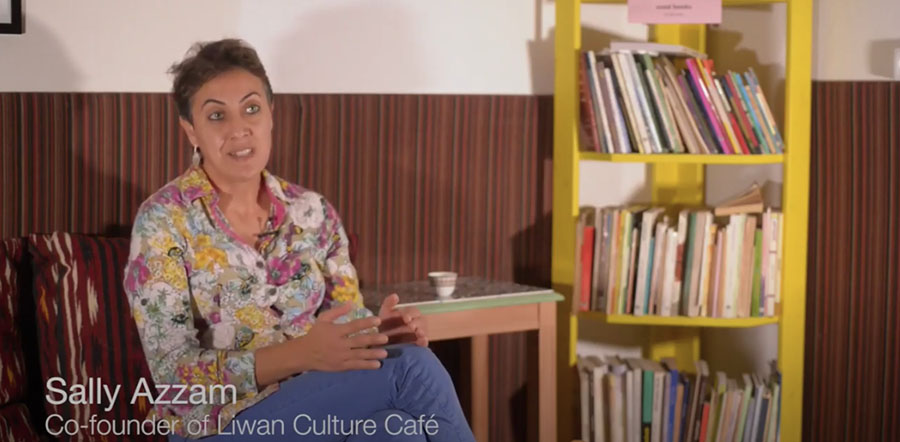
Melissa Chemam
The other day I was invited by the Bristol Palestinian Film Festival to see a short series of films, including Liwan, a documentary directed by Doris Hakim, and co-produced with Adam Newby, taking place in Nazareth — the largest and most populated Palestinian city in Israel.
It is, for a change, a very uplifting Palestinian story, following the co-founders of the café, including Sally Azzam, who lives part of the year in Bristol and was present for a Q&A, and Sami Jabali, and Silke Wanner, who is originally from Germany.
Beginning in 2016, the founders of Liwan faced discouragement and even physical threats, but they kept trying and finally opened their place in the old city of Nazareth. For several years now, Liwan has hosted events such as book readings, lectures, concerts, games, craft sales…And literally brought back to life a neighborhood that for decades was considered as decaying and labeled by the Israeli police as dangerous.
Soon, the café contributed as well to a revival of the whole local souq, with a few other shops opening recently, inspired by their resilience.
The film tells this story very movingly.
The screening event I attended was part of a program titled “Rebel Music” at Bristol’s St. George music venue. And my favorite scene in Liwan was when Palestinian singer-songwriter Haya Zaatry sang her new song at the venue, titled “Tabula Rasa.” Seeing this little cultural center full of happy music enthusiasts listening to a live event was mesmerizing. The Palestinian music scene has obviously faced challenges and obstacles, and many of its famous artists have left to live abroad and produce music in Lebanon, Tunisia France or the UK.
“Palestinians are a minority inside the state of Israel, and their culture has been deliberately and systematically marginalized by the Israeli state,” the founders of Liwan wrote on their crowdfunding page. “Consequently, another major goal for Liwan is to support and promote local Palestinian culture, by hosting concerts by local Palestinian musicians, poetry readings, art exhibitions, showings of films, and acting as a meeting point for tours visiting Palestinian heritage.”

I asked Sally about the importance of music in a space like Liwan, for her and her co-founders, and she shared this interesting story:
When the venue was hardly ready to open, and they were still painting the walls, a famous pianist from Nazareth was filming a documentary about his music journey in the city and walked in. He had come to talk to Sally and Silke and, moved by their project, offered to perform at Liwan the week he was in town. Because the venue had no furniture yet and no piano, he decided to ask his childhood school to give them the piano he used to learn music. The school agreed and brought the piano to Liwan…on a donkey! Hearing the prospects of the opening with this concert, to help, local artists also gave paintings to decorate the place quicker than expected.
And so the pianist did perform at Liwan before leaving Palestine. He filmed the scene of his childhood piano traveling on the back of a donkey, and this became the opening scene of his documentary…
The fact that the cultural venue also contributed to encourage an emerging music scene spoke directly to my heart, as a music lover and music writer, fascinated by songwriters. I wanted to know more.
Haya Zaatry is from Nazareth. She was born there on October 23, 1991, and moved at the age of 18 to Haifa to study architecture and town planning. She formed a few bands with friends, the latest being Ottor, and participated in several political-social awareness projects and concerts.
“’Tabula Rasa’ is actually going to be released on my debut album in a couple of months,” Haya told me via social media. “So it hasn’t been released yet.”
But you’ll soon be able to hear it when we preview it here in The Markaz Review.
Her other song “Baladi,” sung with her band Ottor, became the theme song for the film; you can hear it in the trailer above and here in the full recording, filmed in their studio in Nazareth.
The song is the first single from her coming debut album, “Rahawan.” Haya and her musicians launched a crowdfunding campaign for it in November 2021, and were supported by more than 250 backers. “Thanks to you, we have reached our first goal, and we can now produce and release the album!” wrote Haya on her Facebook page.
First, their song “Ishtar” is actually going live on the magical date of 2.22.22.
The song “Qaluli” / “Alouli” was released early December via Youtube:
It was also launched on the international Paris-based Arabic-speaking radio مونت كارلو الدولية / Monte Carlo Doualiya. You can listen to it here, along with an interview with the singer – in Arabic.

Coincidently, when looking for recordings shared by Haya, the first one I found was a cover version of “Teardrop,” the iconic song by the Bristol-based band Massive Attack that I spent years writing about, because they’ve been such powerful activists and have supported Palestinian artists since the late 1990s.
Music surely has the power to help us travel beyond borders, to inspire us, to incite resistance and to bring people together.
It was ultimately so reassuring to learn that Liwan survived the threats, the pandemic, lockdowns and closures, and is still open and running.
Let’s wrap up with more music, with this live session posted in January in which Haya sings two of her own songs ‘Manakir – مناكير’ and ‘Borders & Promises – حدود ووعود’.


